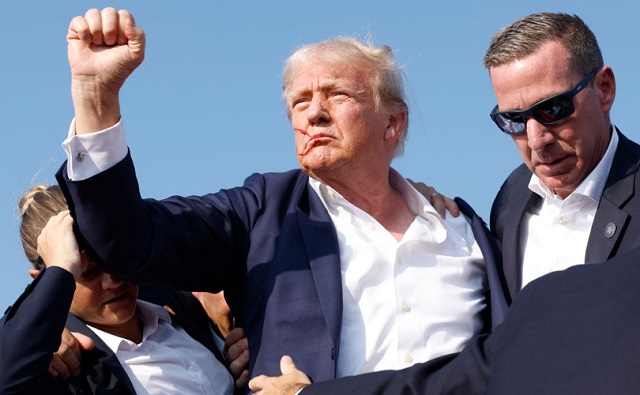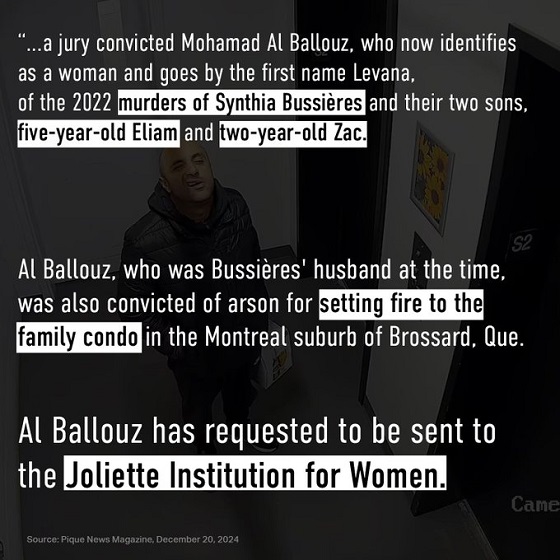International
Trump reacts to assassination attempt: Bullet ‘pierced the upper part of my right ear’

Republican presidential candidate former President Donald Trump is rushed offstage during a rally on July 13, 2024 in Butler, Pennsylvania
From LifeSiteNews
‘I knew immediately that something was wrong in that I heard a whizzing sound, shots, and immediately felt the bullet ripping through the skin.’
The bullet that was fired at former President Donald Trump at a rally tonight “pierced” the upper part of his right ear, he wrote on Truth Social in his first public statement since the assassination attempt.
“I was shot with a bullet that pierced the upper part of my right ear,” the former president wrote. “I knew immediately that something was wrong in that I heard a whizzing sound, shots, and immediately felt the bullet ripping through the skin. Much bleeding took place, so I realized then what was happening. GOD BLESS AMERICA!”

“Nothing is known at this time about the shooter, who is now dead,” Trump wrote. The Washington Post reported that in addition to the shooter, a rally attendee is confirmed dead and two other people are “critically injured.” The nephew of Rep. Ronny Jackson (R-TX) is one of the people who was shot, the congressman told Fox News.
“A source familiar with Trump’s security detail” told The Federalist‘s Sean Davis “that the former and future president’s detail has been asking for beefed up protection and resources for weeks, but has been rebuffed time and again by Biden’s DHS,” Davis tweeted.
An eyewitness told the BBC that he warned the Secret Service after he saw an individual climbing a nearby roof with a gun.
The head of the Secret Service and the leader of this security detail should resign https://t.co/ihlEC5NP1w
— Elon Musk (@elonmusk) July 14, 2024
🚨🇺🇸#BREAKING: NEW footage shows the crowd spotting the shooter BEFORE secret service take action.
“HE'S GOT A GUN!” multiple people yell.
Wow… pic.twitter.com/3vgxPZD6fV
— Censored Men (@CensoredMen) July 14, 2024
A roof with a direct sightline to the stage was not secured by secret service. Our choices here are extreme unbelievable negligence or something much worse. https://t.co/4WcIuLcr3H
— Matt Walsh (@MattWalshBlog) July 13, 2024
UNREAL photo by @dougmillsnyt. You can see the bullet flying by Trump’s head. pic.twitter.com/wSk9oPx1wi
— Caleb Hull (@CalebJHull) July 14, 2024
Senator Mike Lee (R-UT) and Ambassador Robert O’Brien, former U.S. National Security Advisor, issued a joint statement calling for the “political temperature” to be taken down and federal and state criminal charges against the former president to be dropped.
Speaker of the House Mike Johnson announced in an X post that the chamber “will conduct a full investigation of the tragic events today.”
“The American people deserve to know the truth. We will have Secret Service Director Kimberly Cheatle and other appropriate officials from DHS and the FBI appear for a hearing before our committees ASAP,” Johnson wrote.
It appears an American lost their life tonight because he cared about the political process in this country. If you’re worried about the demise of democracy, it’s this.
— Beverly Hallberg (@BeverlyHallberg) July 14, 2024
Now is the time for every American who loves our country to step back from the division, renounce all violence, and unite in prayer for President Trump and his family.
— Robert F. Kennedy Jr (@RobertKennedyJr) July 13, 2024
Former senior federal law enforcement source tells Fox: “Secret service failed. Shooter was high ground, took way too long to get him out and he was exposed if there was a second shooter. That was an inch away from his assassination.”
— Jacqui Heinrich (@JacquiHeinrich) July 14, 2024
Extreme incompetence or it was deliberate. Either way, the SS leadership must resign. https://t.co/0vYGrj6yuH
— Elon Musk (@elonmusk) July 14, 2024
Daily Caller
DOJ Releases Dossier Of Deported Maryland Man’s Alleged MS-13 Gang Ties


From the Daily Caller News Foundation
By Katelynn Richardson
The Department of Justice (DOJ) released documents Wednesday demonstrating Kilmar Armando Abrego Garcia’s membership in the MS-13 gang.
Abrego Garcia’s police interview, immigration court rulings and Department of Homeland Security (DHS) deportable/inadmissible alien record highlighting his membership in the gang, which he has disputed in court, are included in the release.
In a December 2019 decision, the Board of Immigration Appeals dismissed Abrego Garcia’s challenge to an immigration judge’s factual finding that he is “a verified member of MS-13.”
The board found the immigration judge “appropriately considered allegations of gang affiliation against the respondent in determining that he has not demonstrated that he is not a danger to property or persons.”
Officers found Abrego Garcia loitering in a Home Depot parking lot on March 28, 2019, wearing “a Chicago Bulls hat and a hoodie with rolls of money covering the eyes, ears and mouth of the presidents on the separate denominations,” the initial Prince George’s County Police Department Gang Field Interview Sheet states.
“Wearing the Chicago Bulls hat represents that they are a member in good standing with the MS-13,” the document states. “Officers contacted a past proven and reliable source of information, who advised Kilmar Armando ABREGO-GARCIA is an active member of MS-13 with the Westerns clique. The confidential source further advised that he is the rank of ‘Chequeo’ with the moniker of ‘Chele.’”
The administration became embroiled in a legal dispute after Abrego Garcia, who entered the country illegally in 2011, was deported in March to El Salvador as a result of an error. In court records, they argued Abrego Garcia could not “relitigate the finding that he is a danger to the community.”
A lower court ordered his return, but the Supreme Court required it to clarify the order and directed the administration to “facilitate” Abrego Garcia’s release.
The Department of Justice (DOJ) indicated Wednesday that it would appeal the amended order Judge Paula Xinis issued which directed the government to “take all available steps to facilitate the return of Abrego Garcia to the United States as soon as possible.”
During a Monday meeting with President Donald Trump, El Salvadoran President Nayib Bukele said he would not “smuggle” a terrorist into the U.S.
The Department of Homeland Security (DHS) also released court filings Wednesday showing Abrego Garcia’s wife requested a domestic violence restraining order against him.
Daily Caller
Trump Executive Orders ensure ‘Beautiful Clean’ Affordable Coal will continue to bolster US energy grid


From the Daily Caller News Foundation
By
President Trump signed several executive orders Tuesday that will allow coal-fired power plants to stay online past planned retirement dates, identify coal resources on federal lands, and bolster the reliability of the electric grid. The orders may help the U.S. face an uncomfortable truth: wind turbines and solar panels can’t cost-effectively meet the U.S.’ growing electricity needs.
Coal provides an important source of the reliable and fuel-secure energy needed to keep the lights on. Our organization’s research shows that it is more affordable than wind and solar, too.
Mr. Trump’s executive orders will allow coal operators the flexibility to delay the premature closures caused in part by President Biden’s policies. A May 2024 rule from the Biden Environmental Protection Agency would have forced coal plants to spend billions on unproven technology to capture 90% of their carbon dioxide emissions. If coal plants failed to comply by 2035, they would be forced to shutter by 2039. The Trump EPA has since announced it will reconsider this rule, but the process could take years.
Coal should be allowed to help keep the lights on, especially because U.S. electricity demand is rising. The North American Electric Reliability Council’s 2024 long-term reliability assessment warns that “resource additions are not keeping up with generator retirements and demand growth” in most regions of the U.S. Coal produced 16% of the U.S.’ electricity in 2023, and coal, natural gas and petroleum together produced 60%. Nuclear comprised another 18%. It is folly to believe that the U.S. can meet its growing power demands while kneecapping a significant source of its baseload power.
Not only is reliable baseload power a must for the grid, but electricity generated by coal is less expensive than intermittent resources like wind and solar. It’s easy to understand why: the cheapest source of electricity is from plants that have already been built. Most of the U.S.’ coal fleet is like houses where the mortgages have been paid off. With no loans or interest left to repay, operating costs for existing coal plants typically consist of property taxes, insurance, labor, maintenance, and fuel.
Our organization models the full costs of building enough wind, solar, and battery storage to replace coal, natural gas, and nuclear plants. Powering a grid on wind, solar, and batteries is more expensive than coal because connecting wind turbines and solar panels to the grid entails system-wide costs like constructing new transmission lines. The intermittency of wind and solar means you need more power plant capacity to generate the same amount of power. More power plant infrastructure means more property taxes. More weather-dependent resources means more costs to managing the grid, like turning off wind turbines and solar panels when they are producing too much electricity for the grid to absorb — or conversely, ramping up natural gas generation on cloudy and still days when wind and solar aren’t producing.
Our research incorporates system-wide costs and shows that a realistic midpoint estimate for wind turbines is $72 per MWh. Electricity from new solar can range between $50 per MWh to $85 per MWh. Data from the Federal Energy Regulatory Commission shows that the average coal plant generated electricity for only $34 per megawatt-hour (MWh) in 2020 (the last year of available data). It could be even less expensive for coal plants to generate electricity if states and utilities allowed coal plants to operate more often. In 2024, the coal fleet generated electricity only about 43% of the time. If that approached 80%, costs could go as low as $29.
Keeping America’s “beautiful, clean coal” plants online is the right thing for the country and it is good news for consumers that the U.S. has recognized the electric grid’s reliability hole and decided to stop digging.
Isaac Orr is vice president of research, and Mitch Rolling is the director of research at Always On Energy Research, a nonprofit energy modeling firm.
-

 espionage12 hours ago
espionage12 hours agoEx-NYPD Cop Jailed in Beijing’s Transnational Repatriation Plot, Canada Remains Soft Target
-

 2025 Federal Election1 day ago
2025 Federal Election1 day agoRCMP Whistleblowers Accuse Members of Mark Carney’s Inner Circle of Security Breaches and Surveillance
-

 2025 Federal Election1 day ago
2025 Federal Election1 day agoBureau Exclusive: Chinese Election Interference Network Tied to Senate Breach Investigation
-

 2025 Federal Election1 day ago
2025 Federal Election1 day agoNeil Young + Carney / Freedom Bros
-

 2025 Federal Election20 hours ago
2025 Federal Election20 hours agoTucker Carlson Interviews Maxime Bernier: Trump’s Tariffs, Mass Immigration, and the Oncoming Canadian Revolution
-

 2025 Federal Election19 hours ago
2025 Federal Election19 hours agoCanada drops retaliatory tariffs on automakers, pauses other tariffs
-

 2025 Federal Election2 days ago
2025 Federal Election2 days agoMEI-Ipsos poll: 56 per cent of Canadians support increasing access to non-governmental healthcare providers
-

 Autism1 day ago
Autism1 day agoRFK Jr. Exposes a Chilling New Autism Reality








